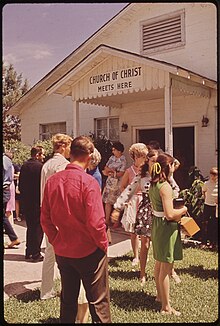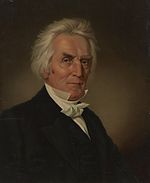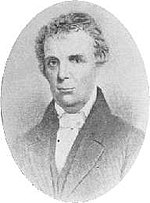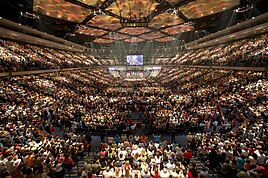|
Non-denominational Christianity
Non-denominational Christianity (or nondenominational Christianity) consists of churches, and individual Christians,[1][2] which typically distance themselves from the confessionalism or creedalism of other Christian communities[3] by not formally aligning with a specific Christian denomination.[4] In North America, nondenominational Christianity arose in the 18th century through the Stone-Campbell Restoration Movement, with followers organizing themselves simply as "Christians" and "Disciples of Christ".[note 1][4][5][6][7] The nondenominational movement saw expansion during the 20th century Jesus movement era, which popularized contemporary Christian music and Christian media within global pop culture.[8][9][10] Many nondenominational churches adhere to congregationalist polity, while others are governed by elders. Some nondenominational churches are independent, while others cooperate in loose associations such as the Churches of Christ; in other cases, nondenominational churches are founded by individual pastors such Calvary Chapel Association established by Chuck Smith.[5] Some non-denominational churches have grown quite recently within networks like Acts 29.[11][12] Certain nondenominational churches are associated with various movements in Christendom, such as evangelicalism or Charismatic Christianity, but many adhere to a form of evangelical Christianity.[13][14][15][16][17] HistoryAlexander Campbell and Barton Stone believed in a nondenominational Christianity, which they spread in what is known as the Restoration Movement.[6][7]  Nondenominational Christianity first arose in the 18th century through the Stone–Campbell Restoration Movement, with followers organizing themselves simply as "Christians" and "Disciples of Christ".[4][6][7] Congregations in this tradition of nondenominational Christianity often refer to themselves as Churches of Christ.[5] Independent nondenominational churches continued to appear in the United States in the course of the 20th century.[18] Nondenominational congregations experienced significant and continuous growth in the 21st century, particularly in the United States.[19][20] In 2010, there were 35,496 nondenominational churches in the US with over 12 million congregants.[21] If combined into a single group, nondenominational churches collectively represented the third-largest Christian grouping in the United States in 2010, after the Roman Catholic Church and Southern Baptist Convention.[22] In Asia, especially in Singapore and Malaysia, these churches are also more numerous, since the 1990s.[23] CharacteristicsWorship services at Christ's Commission Fellowship in the Philippines (top) and Lakewood Church in the U.S. (bottom) Nondenominational churches are by definition not affiliated with any specific denominational stream of Christianity, whether by choice from their foundation or because they separated from their denomination of origin at some point in their history.[24] Like denominational congregations, nondenominational congregations vary in size, worship, and other characteristics.[25] Although independent, many nondenominational congregations choose to affiliate with a broader network of congregations.[25] Many nondenominational churches can nevertheless be positioned in existing movements, such as Evangelicalism and Pentecostalism, even though they are autonomous and have no formal labels.[26][27][28] Nondenominational churches are particularly visible in the megachurches.[29][30] The neo-charismatic churches often use the term nondenominational to define themselves.[31] Some non-denominational churches identify solely with Christianity.[32] Most "other Christians" in America belong to nondenominational churches.[33] Citing data from the Cooperative Congressional Election Study and General Social Survey, political scientist and statistician Ryan Burge noted that nondenominational Christians are very similar to Southern Baptists, but with some caveats. Burge writes, "Nondenominational churches are typically younger and more racially diverse than Southern Baptist churches. On religious matters, both groups attend church at the same rate, yet nondenominationals are more likely to hold a moderate theological position on the Bible than SBC churchgoers. Finally, when it comes to politics it seems that Southern Baptists and nondenominational Christians are very similar. Nondenominational parishioners are slightly more supportive of same-sex marriage and slightly less supportive of abortion rights, but these differences are small."[34] CriticismBoston University religion scholar Stephen Prothero argues that nondenominationalism hides the fundamental theological and spiritual issues that initially drove the division of Christianity into denominations behind a veneer of "Christian unity". He argues that nondenominationalism encourages a descent of Christianity—and indeed, all religions—into comfortable "general moralism" rather than being a focus for facing the complexities of churchgoers' culture and spirituality. Prothero further argues that it also encourages ignorance of the Scriptures, lowering the overall religious literacy while increasing the potential for inter-religious misunderstandings and conflict.[35] Steven R. Harmon, a Baptist theologian who supports ecumenism, argues that "there's really no such thing" as a nondenominational church, because "as soon as a supposedly non-denominational church has made decisions about what happens in worship, whom and how they will baptize, how and with what understanding they will celebrate holy communion, what they will teach, who their ministers will be and how they will be ordered, or how they relate to those churches, these decisions have placed the church within the stream of a specific type of denominational tradition".[36] Harmon argues that the cause of Christian unity is best served through denominational traditions, since each "has historical connections to the church's catholicity ... and we make progress toward unity when the denominations share their distinctive patterns of catholicity with one another".[36] Presbyterian dogmatic theologian Amy Plantinga Pauw writes that Protestant nondenominational congregations "often seem to lack any acknowledgement of their debts and ties to larger church traditions" and argues that "for now, these non-denominational churches are living off the theological capital of more established Christian communities, including those of denominational Protestantism".[37] Pauw considers denominationalism to be a "unifying and conserving force in Christianity, nurturing and carrying forward distinctive theological traditions" (such as Wesleyanism being supported by Methodist denominations).[37] In 2011, American evangelical professor Ed Stetzer attributed to individualism the reason for the increase in the number of evangelical churches claiming to be nondenominational Christianity.[38] Ryan Burge argues that nondenominational churches are less equipped to monitor or report sexual abuse cases because they lack national organizations to do so. Because of nondenominational churches lack of organizational structure, accountability is minimal.[39] In an article on evangelical clergy sex abuse in The New Republic by Elle Hardy, religious studies scholar Matthew D. Taylor argues that the relative lack of accountability in nondenominational churches attract pastors "who are more megalomaniacal and authoritarian in their personality”. Since nondenominational churches lack a hierarchy to answer to, pastors with authoritarian personalities are given more opportunities to exert power and control over their congregants. Nondenominational preachers claim to have oversight from their boards and mentorship from "spiritual parents", but these are usually people they know. Taylor argues, “They’re incentivized to protect their friends and protect the oligarchy. They all have a stake in it, and none of them have personal incentives other than principled theological convictions to actually hold their friends accountable, so that the incentives all push in the direction of abuse and cover-up rather than in the direction of accountability and exposure.” [40] See also
Notes
References
External links |




